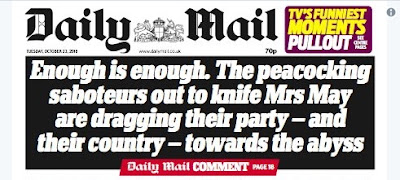Media columnist Margaret Sullivan in The Washington Post: "The mainstream media, however flawed, has managed to tell us who Trump is. Even the worst of it — the way lie-filled briefings on the coronavirus, in which the president promoted untested cures and pure quackery, were broadcast live to the nation — had the benefit of showing people how unfit he was. And the best of the Trump-era journalism has been crucial, true to its democratic mission of holding the powerful accountable."
Donald Trump on Twitter: "Since when does the Lamestream Media call who our next president will be? We have all learned a lot in the last two weeks!"
Christiane Amanpour on Twitter: "A reflection on President Trump’s comments last night: The last President I covered who refused to accept the vote count in an election was Mahmoud Ahmadinejad in Iran, 2009."
Matthew D'Ancona on Tortoise: "The true gatekeepers to Biden’s presidency were the networks, specifically at the moment on Thursday night when ABC, CBS and NBC cut off President Trump’s deranged rant about alleged voter fraud. He who lives by media, dies by media. The reality television host who made it to the White House by treating politics as a branch of the entertainment industry was, in the end, deposed because he had committed the cardinal sin of the entertainment world: he had become a bore, an embarrassment, old news."
Kyle Pope in the Columbia Journalism Review on the US election: "Once again, opinion polls were overhyped and under-scrutinized. Some of them were also wildly off—and, though that’s different from 2016, when the polls were largely accurate but widely misunderstood, it doesn’t let media organizations off the hook for their treatment of the numbers. Newsrooms leaned too heavily on polls as a substitute for on-the-ground reporting, and they were led astray. Journalists spent too much time talking to each other on Twitter, inhabiting an alternate algorithmic reality that bore little resemblance to the life of the country."
Nick Robinson on Twitter: "Watching @FoxNews to see how they cover the election. Someone they call a correspondent has just said on air that pollsters are 'partisan pornographers who worked with Joe Biden to suppress the vote'. Extraordinarily there are people here who want our TV news to be more like Fox."
Jane Martinson in the Guardian: "BBC presenters who dare to express opinions – Emily Maitlis on Dominic Cummings, for example – are slapped down as executives fret about the impartiality of an organisation that believes it must be representative of all licence fee payers. But true impartiality allows reporters to say that politicians are lying if there are facts and evidence to prove it. Such calls are essential not just for democracy but the future of journalism, even if a combination of financial, political and technological pressure has made them harder."
Gerard Baker in The Times [£]: "Mr Trump defied the predictions of pollsters, the ravages of a pandemic, a big financial advantage for his Democratic opponent and the best efforts of a media that has simply disgraced itself with its complete abandonment of any last pretence of objectivity."
Ian Burrell in the i: "A Trump victory would have left the cream of the American Fourth Estate looking marginal and powerless. It nearly happened. The 70 million who voted for him have used the ballot box to declare their contempt for mainstream news, which must somehow find a way to regain their trust."
Alan Rusbridger on the reporting of COVID-19, in the preface to the Reuters Institute annual report:"Lives depended on the words journalists wrote; the numbers they crunched; how well they understood and could communicate the science. COVID-19 has, again at the time of writing, killed nearly a million people worldwide. But it has also accelerated the already menacing trends in media – closing titles, depressing revenues, speeding up the switch to digital, throwing thousands out of work."
Piers Morgan on Twitter on the departure of Downing Street director of communications Lee Cain: Great to see @BorisJohnson's communications chief Lee Cain - who once dressed up as a chicken to mock Tory ministers for refusing to take part in TV debates & then led this Govt's cowardly 196-day boycott of
@GMB - forced out of No10. He's a snivelling little worm. Bye Lee!"
Kelvin MacKenzie on his new book due out next year called 'Murdoch, Me and Other Madmen': "Honestly, it will be an absolute rip-roaring success."
The Northern Echo reports: "A 'FAKE journalist' has pleaded guilty to fraud after publishing articles copied from The Northern Echo. Aaron Michael Jack, 27, of Eldon Street, Darlington, was running a website called the North East News Agency, which was found to consist of news stories copied from the Northern Echo and passed off as his own work. On the site, each news story was followed by 'A note from the Editor. Please consider making a voluntary financial contribution to support the work of North East Alternative News and allow it to continue producing independent, carefully-researched news stories'.”
- Jack pleaded guilty to fraud and to two charges of publishing images which he knew were infringing copies of copyright and was fined £50 for each of the three offences and ordered to pay costs.
[£]=Paywall





















































